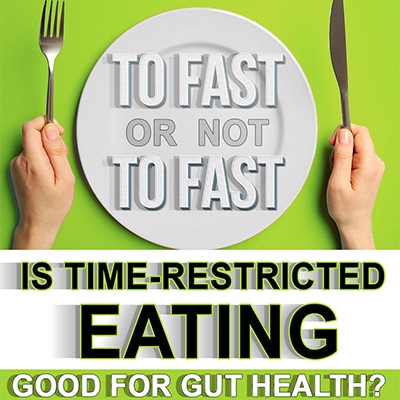To Fast or Not To Fast: Is Time-Restricted Eating Good for Gut Health?
Even the simple mention of the word “fasting” makes most people’s skin crawl. With easy access to fast food restaurants and corner grocery stores, food is literally at our fingertips 24/7.
Americans have formed a bad habit of grazing on food throughout the day. But just because it is a habit, doesn’t mean it’s a natural process.
Imagine the caveman days, when their whole purpose of the day was hunting and gathering food.
Sometimes they wouldn’t find nourishment for days – unlike the modern times when you don’t have to walk very far for a snack.
Homo sapiens have evolved in the blink of an eye compared to other lifeforms.
So the human gut hasn’t had time to properly develop into something that can digest for long periods of time.
Your gut bacteria needs time to rest so they can properly heal and repair.
Getting back to the basics of intermittent fasting in your life can help reduce inflammation and even prevent certain diseases.
Intermittent Fasting Basics
Intermittent fasting doesn’t require week-long fasting excursions. This type of fasting is sporadic. You’re restricting the time frame in which you consume calories on a daily basis similar to your ancestors.
The most popular form of intermittent fasting is the 16/8 interval. This is 16 hours of fasting with an 8-hour window eating period.
This fasting is easiest for most because you’re already in a fasting state while you sleep. So when you wake, skipping breakfast for a few hours seems feasible and not so daunting.
During intermittent fasting, you’re still able to drink water, tea, and coffee, but no added milk or sugar.
Research shows, depending on the time of day and when you eat your microbes in your gut are able to digest them more efficiently. Not only can these microbes digest your food better, but when they’re fasting they’re also repairing your gastrointestinal tract.
Intermittent fasting is linked to weight loss for obvious reasons such as reducing caloric intake, but this isn’t the only reason. During intermittent fasting there’s a significant increase in the human growth hormone, which makes stored body fat more accessible to burn.
Time-restricted eating can also be beneficial for gut repair since research shows fasting effects your gut microbiome.
By fasting, you can reduce gut inflammation and increase gut microbiota diversity to help heal digestive problems.
Not Just About What You Eat – When You Eat Matters Too
Do you ever wonder how your body knows it’s time to sleep or when it’s time to wake?
It’s the circadian rhythm in your body that takes cues from the light and darkness. Your sleep-wake cycle is in sync with the sun just as it has been since the dawn of time.
This has led to the evolution of a 24-hour internal timing mechanism called your circadian rhythm or biological clock.
During the sleep cycle, it’s a period of rest, rejuvenation, and repair for your brain. Your body is in standby mode, repairing itself from the day through autophagy.
Autophagy literally means “self-eating” where your cells naturally cleanse your body of dysfunctional components.
I’m sure you’ve heard the saying, “Don’t go to bed on an empty stomach.”
This is because the microbes in your gut also have their own circadian rhythm, which is considered your peripheral clock. Your gut rhythm takes cues from the nutrients you eat, but more specifically when you eat them.
Research shows your gut bacteria isn’t fully “awake” in the early rest periods – early morning and at night. So when you feed your gut bacteria breakfast as soon as you get up in the morning it’s similar to someone throwing cold water on you to wake up.
You’re not in a very happy or rested mood, are you?
Autophagy in your gut is induced during your fasting or “starvation” stage – cleaning up all the gunk and dysfunctioning molecules.
Research shows fasting can help heal a leaky gut and inflammatory bowel disease by reducing inflammation and gut permeability through autophagy.
During this self-cleansing time, autophagy plays an important role in eating and eliminating different gut pathogens which are damaging your epithelial mucosal barrier.
When you fast you’re giving your gut a major spa day.
Benefits of Intermittent Fasting
Intermittent fasting is not just another fad diet backed up by pseudoscience. It’s actually not even a diet at all because it doesn’t restrict you from certain foods – only the time of day you eat.
The scientific-based research supporting intermittent fasting is endless.

The following studies show how intermittent fasting benefits your overall health by:
- Facilitating weight loss by improving your metabolism
- Strengthening your immune system to fight off pathogens
- Reducing gut permeability
- Decreasing inflammation and oxidative stress
- Improving insulin sensitivity
- Increasing your life longevity
- Combating metabolic syndromes, cardiovascular disease, cancer, and neurodegenerative disease
- Improving brain structure, function, and mood
- Influencing beneficial gut bacteria
Giving your gut a well-needed rest through intermittent fasting can improve every aspect of your health.
Nourish Your Microbes Without Sabotaging Your Fast
Getting back to your roots and eating the way humans have naturally evolved is more beneficial than just losing weight.
Fasting kills unwanted gut bacteria through autophagy. Intermittent fasting has been widely used for healing digestive problems such as inflammatory bowel diseases and leaky gut.
Taking a prebiotic full of polyphenols during intermittent fasting can help boost your healthy bacteria. Since you’re essentially starving all gut bacteria, good and bad, you can supplement with Atrantil’s prebiotic and polyphenol supplement without sabotaging your fast.
Feeding your beneficial bacteria with a light meal keeps them healthy, happy, and flourishing.
The polyphenols in Atrantil help promote further gut repair in conjunction with intermittent fasting. And from previous articles, we know that your good gut bacteria rely on a healthy hearty diet.

I am very pleased with this product. I took 2 caps 2-3 times a day with 250 mgs of oregano oil for 3 weeks. Now taking maintenance doses for idk how long.
Hi Angela,
Thank you so much for your feedback. We love hearing back from our customers and we are so happy you are having great results with Atrantil! Please let us know if we can ever be of assistance.
Thank you and best wishes,
Team Atrantil
Can you take Atrantil on an empty stomach while intermittent fasting? I just received my order, but I’ve been intermittent fasting for a month. Can you take this on an empty stomach?
Hi Kathy,
Thank you for your interest in Atrantil! We recommend still taking the full dosage of 3 times a day, making sure it spaced out throughout the day a few hours apart. It is important to be consistent in taking Atrantil in order for it to work. With that being said, it is perfectly safe to take it on an empty stomach and will not break your fast. In fact, it will actually continue to nourish your microbiome even while you are not eating.
We hope this helps to clarify.
Best wishes,
Team Atrantil
Very knowledgeful lesson for we Indians
I am senior doctor MBBS FOR MANY YEARS. THIS CHAPTER HAS OPENED MY 3RD EYE. I HAVE NOW UNDERSTOOD BASICS OF GUT HEALTH AND sequale of leaky gut